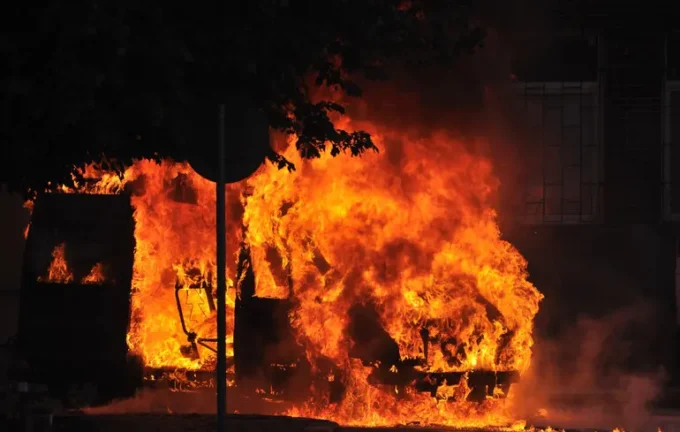Mastery of disinformation: investigation into the arson of Bundeswehr trucks in Germany

On June 22, a large-scale fire broke out in the city of Erfurt, the administrative center of Thuringia, which attracted the attention of the international community and caused political and informational tension. The fire destroyed six trucks belonging to the German military department, the Bundeswehr. However, a few days later, Russian media and pro-Russian Telegram channels tried to use this event for propaganda purposes, spreading reports that the fire was caused by arson and that military equipment intended for supplies to Ukraine had allegedly burned down. This caused a wave of disinformation that spread across the diplomatic and military spectrum. Official representatives of the German Ministry of Defense denied this information at the end of June. In a comment to DW, the head of the department, Kenneth Harms, emphasized that the burned trucks were used exclusively for service work and routine internal logistics. According to him, the damaged vehicles are equipment that supports the country's armed forces and have nothing to do with international arms supplies or military programs for Ukraine. The first alarm bells rang through posts on Russian Telegram channels. There, videos and photos of burned trucks were distributed with captions that this was an act of sabotage directed against Western support for Ukraine. They claimed that Russia was behind the incident and that the trucks were part of the aid to the Armed Forces of Ukraine. Given the speed of the spread of false information, experts and law enforcement officers have launched an investigation to find out the true circumstances of the fire and Russia's possible role in this. At present, the investigation in Erfurt has already confirmed that the destroyed trucks are mainly equipment for internal maintenance, and not military weapons or weapons for Ukraine. In addition, several versions have been opened, and one of the main ones is a possible connection with Russian special services, in particular the GRU. The Erfurt prosecutor's office has already announced that it is investigating this possibility and is tracking who exactly distributed the video footage of the fire, which contributed to the spread of disinformation. This is one aspect of the hybrid war that Russia is waging against Europe, trying to weaken support for Ukraine and sow doubts about the stability and security of civilian and military structures. This is not the first such case. At the end of last year, arson attacks on military equipment were already observed in Germany. In June, for example, in the city of Soltau, Lower Saxony, six army vehicles burned down at once. Similarly, in June 2024, several trucks undergoing repairs at a MAN service center were set on fire in Erfurt. Given this trend, German police have stepped up efforts to solve the arsons and establish their motives. One possible direction of the investigation is Russia's role in organizing such attacks. Now law enforcement agencies have already announced that they are investigating this case, and one of the main versions is the participation of Russian special services, which seek to destabilize the situation in Europe and increase internal tensions within the EU member states. An important element of this game is also the search for those who published and distributed the video of the fire. This will eliminate the disinformation narrative and reduce its impact on public opinion. In general, the incident in Erfurt once again demonstrates how distorted reality and information warfare are becoming an integral part of modern conflicts. As a result of the so-called hybrid operations, false traces are created that can complicate the investigation and sow chaos in European security. Ordinary events are turned into tools of propaganda and political pressure, which is a completely appropriate strategic pursuit by Russia of its interests in the struggle for influence and control in the region. We can say that in this situation the goal is not only to spread false information, but also to create chaos that helps Russia reduce support for Ukraine on the Western fronts. Several people suspected of pro-Russian sabotage and preparation for acts of violence have already been detained in European countries. In particular, two citizens with Russian roots were arrested in Germany, suspected of planning attacks on American military facilities and collecting intelligence for the GRU. In Poland, a man was detained who was preparing to transfer information to Russian intelligence at the Rzeszow airport. The Baltic countries also reported recruiting Russian agents to carry out provocative actions on their territory. With all this, the investigation is trying to confirm or refute the theory about a new mandate for Russian agents, who received funding to intensify hybrid operations. NATO has already officially identified such incidents as part of an intensified destabilization campaign, including sabotage, cyberattacks, disinformation campaigns and other hybrid actions aimed at stability in Europe. This trend not only highlights the strategic nature of modern warfare, but also emphasizes the need for enhanced information security and international cooperation to counter such challenges.

